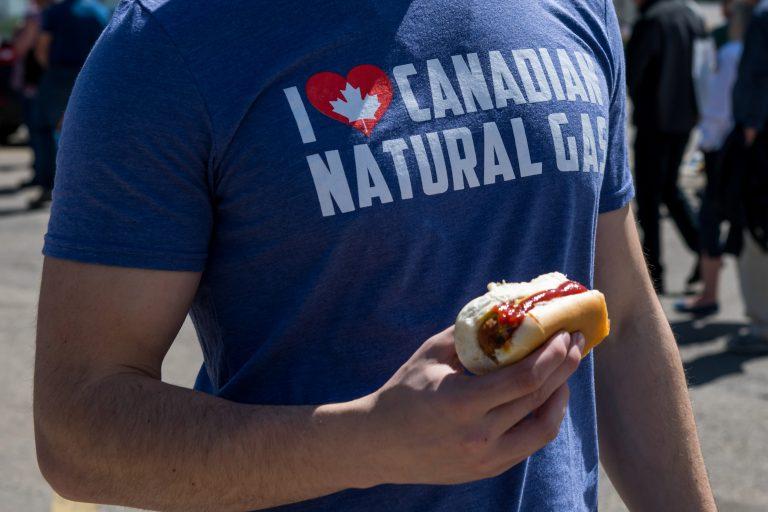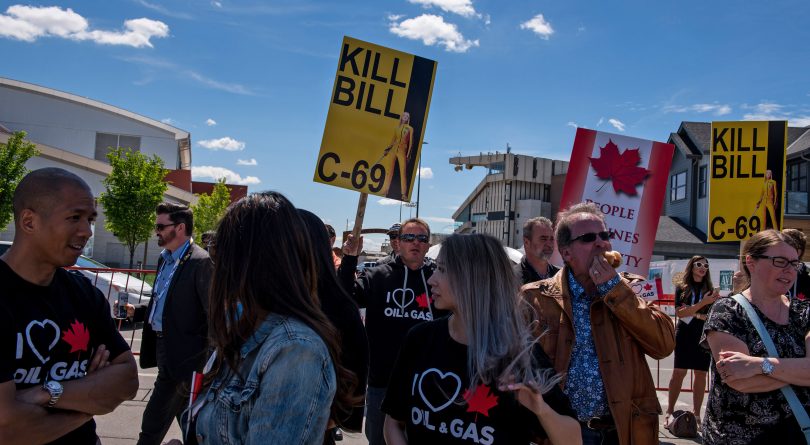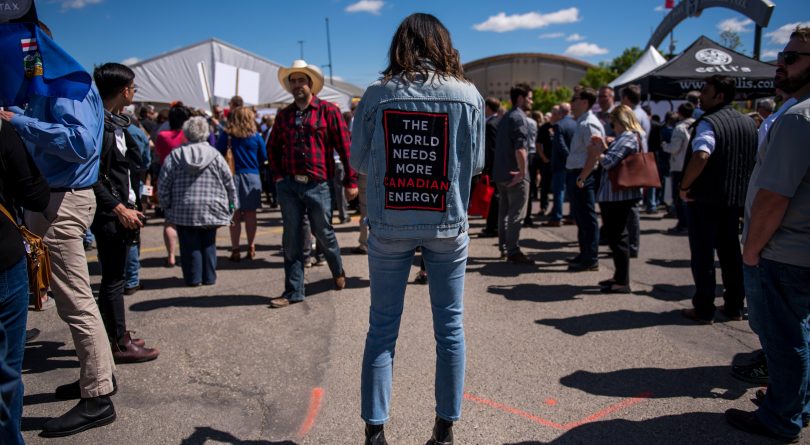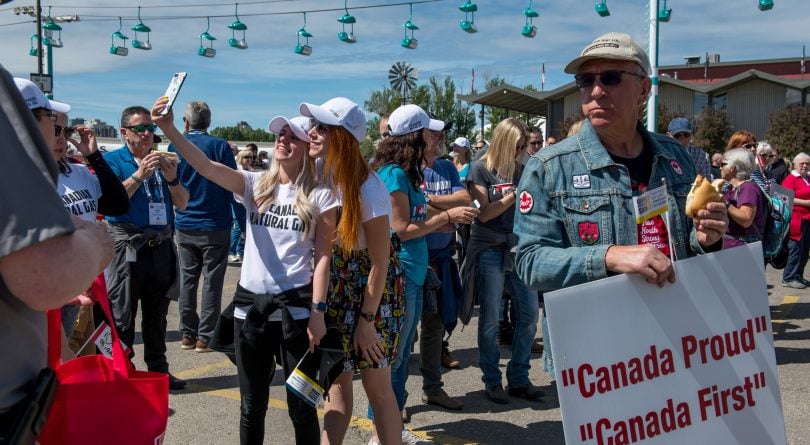The rise of Alberta’s unapologetic petro-patriots
Legions of Albertans are showing their allegiance to oil by wearing their hearts on their sleeves (and caps and T-shirts and hoodies). Is it a defensive posture?

Thousands of Albertans at a Canada Action rally for the oil and gas industry, which is deeply entwined with their collective identity (Photograph by Guillaume Nolet)
Share
Josh McEwen’s camping trailer attracts stares when he escapes into Alberta’s wilderness. He wants it that way. Campers stop, squint and often remark at the bumper stickers on his trailer and truck—“I love Canadian oil and gas,” with heart and maple leaf emblems. “I’ve had everything from people giving me thumbs up to asking where I got the stickers, the shirts, all the way to ‘I can’t believe you would advertise something like that,’ ” the Calgary petroleum engineer says.
Merchandise bearing the petro-positive logo has existed for about six years, but around Alberta lately it has become remarkable for its near ubiquity. People sport it walking through Calgary’s downtown mall on casual Fridays, or waiting on transit platforms. It’s on the sides of office buildings and highway billboards. It’s the uniform for a Little League baseball team in Drayton Valley. It’s on the welcome sign to the Spirit River rural district. It was on a toddler’s onesie when the manager of an Alberta produce stand announced the birth of his newborn son to the Facebook world.
On a sunny afternoon in June, McEwen and his black hoodie joined a sea of such logos at what organizers billed as Canada’s largest-ever pro-oil rally—between 3,000 and 4,000 people. Downtown energy workers flocked to the venue, the Calgary Stampede grounds; McEwen says his company encouraged staff to go on their lunch break. A double-length fuel truck parked by the crowd bore the “I heart” logo, as did countless T-shirts and placards, with variations expressing pride for pipelines, oil sands and natural gas. The pro-industry flag-waving got literal with the miniature flags that organizers handed out, featuring the heart-and-leaf logo bracketed by thick red vertical stripes.
“We should be so proud of ourselves. We’re speaking up,” rally emcee Cody Battershill proclaimed. “We’re taking action to take back our economy and take back the conversation.”
Petro-patriotism has gathered strength in oil country, after five years of economic slump. Albertans have long intertwined their collective identity with their province’s key industry, but have never before worn it on their chests like this. Like any patriotic/nationalistic movement, it identifies external foes: environmentalists (some abetted by foreign funding!) and the Trudeau government that have delivered pipeline delays and environmental measures like the carbon tax and an oil tanker ban on the northwest B.C. coast. Newly elected Premier Jason Kenney has eagerly donned the mantle as the industry’s chief defender: his campaign pickup truck bore the bumper sticker, too.
The pride comes, of course, with dollops of defiance: as much of the world and Canada demand climate change solutions, the petro-patriots insist Canadian fossil fuels are already the world’s most responsibly produced and that the burden to act should shift elsewhere; some still deny there’s a human-caused problem at all. “Global warming is a made-up story,” Vit Jankovic, a retired pipeline technician, told Maclean’s at the rally. “I like to think of it as scientists playing their video games to see who can get more warming in.”

Polls show a stubborn gap between how Albertans and other Canadians feel about climate change and energy. It’s tough to even bring up climate change with many Albertans without them feeling under attack. Petro-patriotism is their way of fighting back. Wearing the shirt in much of the province (or in Saskatchewan) is akin to wearing a band shirt at the band’s concert. Are the gatherings and unabashed pride an urgent message to fellow Canadians, or is it a form of conservative virtue signalling within a safe space? To those who suit up, at least they’re doing something.
Battershill launched his pro-oil mission in 2010 after seeing an in-store “anti-tar sands” campaign mounted by Lush Cosmetics. The Calgarian found the messaging alarmist, offensive and contrary to other information he’d read and heard; as a young real estate agent in a sometimes boomtown, he recognized it as an indirect threat to his livelihood. Inspiration for the “I love oil” shirts came, he recalls, from a shirt touting a skateboard brand that he saw on someone at a spin cycling studio—the same place he met his wife, who is from Vancouver. “She thought my shirts were a joke at first,” he says, “because at the time it was generally [thought] oil sands is dirty, oil sands is bad.”
Battershill’s not-for-profit Canada Action Coalition strove to combat those ideas. Alongside his online swag shop, he launched Facebook and Twitter accounts in 2013 with memes about various household products made with petrochemicals, highlighting positive aspects of Canada’s environmental record and Quebec’s reliance on foreign oil. “We are so proud of our Olympians, our hockey teams, our national parks,” Battershill says. “We should be just as proud of our resource wealth, our blessing, our gift, and the way that we produce it.”
Larger industry groups, with their own attempts at public goodwill, initially approached Battershill’s fervent efforts with caution. “Things that are shrill—at either end of the spectrum—are great, but you’re only talking to yourself,” Jeff Gaulin, then an executive with the Canadian Association of Petroleum Producers (CAPP), told Alberta Oil magazine in 2014. But not long after, CAPP launched a look-alike meme-happy movement, Canada’s Energy Citizens. More recently, as pipeline delays and federal legislation got the oil patch in a punchier mood, Big Oil more firmly embraced Canada Action, which Battershill still leads on the side of his real estate job, with staff operators. Companies place large bulk orders for his apparel, and a handful of firms and associations each put up $2,500 sponsorships for his “grassroots” rally, which ran alongside Calgary’s annual Global Petroleum Show.
The rally speakers were all conservatives, though Battershill stresses his group is non-partisan. Natural Resources Minister Amarjeet Sohi, a Liberal, spoke last year at an Edmonton pro-pipeline demonstration and got resoundingly booed. Since then, federal ministers visiting Alberta have been targets, not stars, of petro-protests.

Rachel Notley’s Alberta NDP got on board with the logo gear, as a way of asserting pro-industry bona fides. “I have a whole wardrobe of that stuff,” remarks Marg McCuaig-Boyd, the former NDP energy minister. She lives in Alberta’s rural northwest, where the industry dominates and the shirts are business-casual wear, she says.
When she joined a local pro-pipeline rally, many were baffled to see a New Democrat, she says. “There’s that thinking that you’re either with us or you’re not. There’s no spectrum in between, that people can like the oil industry but also want to see climate action.” Not only did a surprising number of her constituents doubt that carbon pricing would change habits, McCuaig-Boyd says, they also doubted climate science.
Such skepticism is not dominant in Alberta (bumper-sticker-brandishing McEwen, for one, believes industry should do more on emissions, and that well-designed carbon taxes work). But it appears to be more prevalent than in the rest of the country. Fifteen per cent of Albertans believe climate change is a hoax, according to an unreleased Abacus Data poll from May provided to Maclean’s, compared to nine per cent in the rest of Canada. In Alberta, 45 per cent believe it’s a crisis that requires immediate action (59 in the rest of the country), which makes it the only province where a majority doesn’t believe urgent action is necessary. “I wonder if it’s because the moment you admit it’s an issue, then the next question is what are you going to do about it,” Abacus CEO David Coletto says of the oil-producing province. As climate anxiety rises in the rest of Canada, many Albertans will only feel more isolated within their own country. In the 1980s, the National Energy Program drove a wedge between Alberta and central Canada over who controls the vital resource; now what Albertans feel to be at stake is the very existence of their prized sector, Coletto notes.

An initiative called the Alberta Narratives Project worked last year to plot escapes from this impasse. A coalition of academics, environmental groups, philanthropic foundations and oil-industry players hosted dozens of private dialogues to stir discussion on energy and climate across demographic lines—from rural Albertans and oil workers to young people and Christian groups. It found that Albertans warmed to comments about diversifying their economy and climate change as an emerging challenge, but routinely bristled at mention of huge threats and transition. For some, even some basic terms create problems. “The label ‘climate change’ itself is a dog whistle because it’s so tightly tied to environmentalism,” says project manager Amber Bennett. “It’s a good way to shut down the conversation.” Julia-Maria Becker, clean economy director for the Pembina Institute, finds her title can be counterproductive to the conversation. “Because people automatically feel that if I call myself clean, I call them dirty.” Becker’s environmental think tank, long one of the Canadian eco-movement’s most moderate groups, now finds itself vilified by pro-oil hardliners, and by Kenney, for having taken American foundation money as part of an anti-tar-sands campaign. Becker says the environmental movement could itself learn from the Narratives report when it comes to not stifling discussion or striving to pull everyone over to their side of the debate.
Pat Carlson, a longtime oil and gas executive, helped fund the Narratives Project. For decades he has worried about the threat of climate change and now regrets not speaking out when fellow energy leaders expressed cynicism about the science. The growing tribalism worries him—he was surprised to find the “I heart oil and gas” logo featured on the cover of each issue of a Calgary business magazine in his office lobby.
“People are sticking with their tribe and it’s very dangerous because it provides a welcome audience for the climate change deniers and the climate change doubt,” he says. But he understands the fear that’s driven the movement.
“I don’t have a shirt, but I do love Alberta oil and sympathize with the people concerned about their jobs.”
If you love something, Battershill says, “you want to protect it.” As environmentally concerned and risk-averse global financial institutions like HSBC have sworn off new investments in oil sands or pipelines, Canada Action urged a boycott in response, while Kenney vowed his government would swear off business with the bank. Both urged financiers to consider Alberta crude some of the planet’s most ethically produced and rethink Mideast “dictator oil.”
Zurich Insurance, however, followed HSBC’s lead in late June, seemingly unmoved by T-shirt logos and miniature flags.
This article appears in print in the August 2019 issue of Maclean’s magazine with the headline, “Rise of the petro-patriots.” Subscribe to the monthly print magazine here.